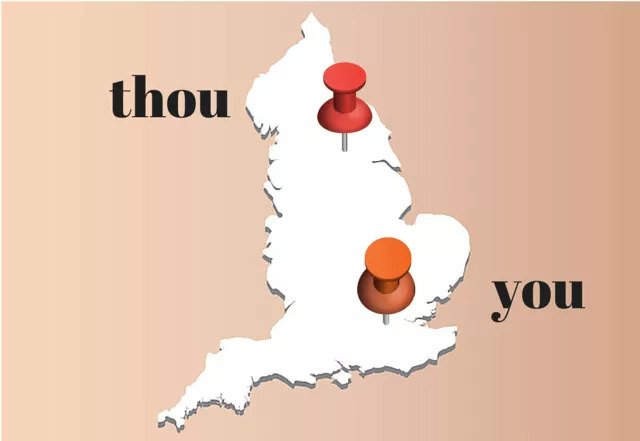A couple of weeks ago, after I talked about how the pronoun you fills so many roles, I started wondering why we stopped using thee and thou.
It turns out that English used to have formal and informal pronouns like many other languages. German has Sie and du, French has vous and tu, Spanish has usted and tú, and during Shakespeare’s time, English had thou and you and thee and you.
Thee and Thou Were English’s Informal Pronouns
Since thee and thou have survived mainly in religious and poetic writing, you may be surprised to learn that thee and thou were the informal pronouns. Yup. You was formal, and thou was informal.
In a book called The Personal Pronouns in the Germanic Languages, Stephen Howe says that in the fifteenth to sixteenth centuries, thou was generally used to address someone who was socially inferior or an intimate. For example, parents called their children thou, and children called their parents you, but then the use of thou sharply decreased in the seventeenth century, starting in London. Thou was used the longest in areas that were farthest from London, and in fact, it’s still used in a few regional dialects including those in Yorkshire and Cumbria, which are both quite a bit north of London.
When Social Status Became Unclear, People Started Using You More
The reason people stopped using thou (and thee) was that social status—whether you were considered upper class or lower class—became more fluid during this time. You had social climbers striving to talk like the upper class, so they used you all the time instead of thou, and since you couldn’t be as sure as you used to be about who was in what class, it was safer to use you instead of thou because you didn’t want to risk accidentally offending someone in the upper class by using the wrong pronoun. You didn’t want to call someone thou when you should have used you!
What Do the Quakers Have to do With Thee and Thou?
Sometimes questions come up about whether the Quakers were involved in the loss of thee and thou. The Quakers actually used those pronouns longer than almost everyone else. They favored what they called “plain language,” and they aimed to be egalitarian, embrace humility, and avoid markers of class and status. They believed that addressing a social superior as you fanned the flames of vanity. As an aside, they also refused to use titles such as mister or your ladyship, and this could get them in trouble if they ended up in court because they also refused to address a judge as your honor.
Although I didn’t find anything definitively convincing, a couple of sources speculate that anti-Quaker sentiment could have hastened the demise of thee and thou. Since fewer and fewer people were using the pronouns, they became associated with Quaker-speak, so if you didn’t like the Quakers, you were probably even less likely to use thee and thou.
Thee and Thou Became Insults
Plays and legal documents from the time do show that people were using thee and thou as insults too. The attorney-general at Sir Walter Raleigh’s trial taunted Raleigh by saying “All that he did was at thy instigation, thou viper; for I thou thee, thou traitor.” And a 1913 article in Harper’s Magazine recounts a story from George Fox, the founder of the Quakers, on the trouble he encountered when using thou. “We were often beset and abused, and sometimes in danger of our lives for using these words to some proud men, who would say, ‘What! You ill-bred clown, do you thou me?’” It’s hard to understand now, but at the time, it was almost unthinkable to call a superior thou.
So it seems that English lost its informal pronouns because people were afraid of offending those who thought of themselves as upper class and because some people were actively using the pronouns thou and thee as insults.
It’s interesting that more recently it’s the formal pronouns that are being used less often in languages such as Spanish and German. It seems that our values are different now—today, we value informality more than formality.
The sources I found include much more detail and nuance about how thee and thou used to be used, more about where they remain, more examples of how they were used as insults in plays and legal proceedings, and more about the Quakers’ attitudes on language. It’s great reading if you’re interested, so don’t skip the sources below.
See also Why Does I Take Plural Verbs.
Sources
Firth, A. “Summary: Thou and You.” Post to Linguist List 7.599, Tuesday, April 23, 1996. Click this link (accessed November 29, 2014).
Hamm, T. “This History of Quaker Plain Speech.” YouTube, QuakerSpeak channel. June 19, 2014. click this link (accessed December 11, 2014).
Higg, R.M, Blake, N.F., Romaine, S. and Burchfield, R.W. (eds.) The Cambridge History of the English Language, Volume 4. Cambridge University Press. 1992. click this link (accessed November 29, 2014).
Howe, S. “The Personal Pronouns in the Germanic Languages: A Study of Personal Pronoun Morphology and Change in the Germanic Languages from the First Records to the Present Day.” Walter de Gruyter & Co.: Berlin. 1996. click this link (accessed November 29, 2014).
Lawn, R. “Tu and Twitter: Is it the end for ‘vous’ in French?” click this link BBC News Magazine. September 6, 2012. (accessed December 3, 2014).
Liberman, M. “George Fox, Prescriptivist.” Language Log website. October 24, 2010. click this link (accessed December 11, 2014).
Lounsbury, T. R., “Pronouns of Address.” Harper’s Magazine, Volume 126. 1913. p.202. click this link (accessed December 3, 2014).
Walker, T. Thou and You in Early Modern English Dialogues: Trial, Depositions, and Drama Comedy. John Benjamins Publishing. 2007. click this link (accessed November 29, 2014).
“Politeness in Early Modern English: The Second Person Pronouns.” click this link (accessed April 12, 2022).
Image courtesy of Shutterstock.




